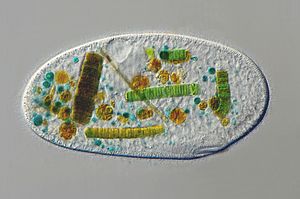Frontonia facts for kids
Quick facts for kids Frontonia |
|
|---|---|
 |
|
| Frontonia sp., a tiny ciliate, digesting cyanobacteria. Its mouth (cytostome) is at the bottom right. | |
| Scientific classification | |
| Domain: | |
| (unranked): |
SAR
|
| (unranked): | |
| Phylum: | |
| Subphylum: |
Intramacronucleata
|
| Class: |
Oligohymenophorea
|
| Order: |
Peniculida
|
| Family: |
Frontoniidae
|
| Genus: |
Frontonia
Ehrenberg, 1838
|
Frontonia is a tiny, single-celled creature. It's a type of protist called a ciliate. These amazing organisms live freely in water. Frontonia is quite similar to another well-known ciliate, Paramecium.
Contents
What is Frontonia?
Frontonia is a unicellular organism. This means it is made of only one cell. It belongs to a group called ciliates. Ciliates are known for having tiny hair-like structures called cilia. These cilia cover their bodies. They use cilia to move around and to sweep food into their mouths.
Where do Frontonia Live?
Frontonia are found all over the world. They live in many different water environments. You can find them in both marine (salty ocean water) and freshwater (like ponds and rivers). They are truly widespread, living on every continent.
What do Frontonia Eat?
Frontonia are active eaters. They use their cilia to create currents in the water. These currents help them pull in food particles. Their diet is quite varied. They can eat tiny diatoms, which are a type of algae. They also consume cyanobacteria, which are often called blue-green algae.
Sometimes, they eat other types of filamentous algae. They can even feed on testate amoebas. Amazingly, Frontonia can sometimes eat other Frontonia of their own species!
Images for kids
See also
 In Spanish: Frontonia para niños
In Spanish: Frontonia para niños
 | Laphonza Butler |
 | Daisy Bates |
 | Elizabeth Piper Ensley |



